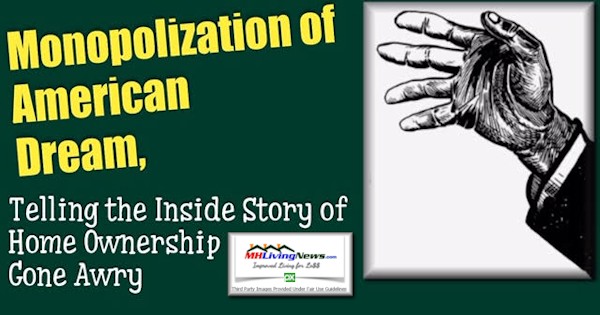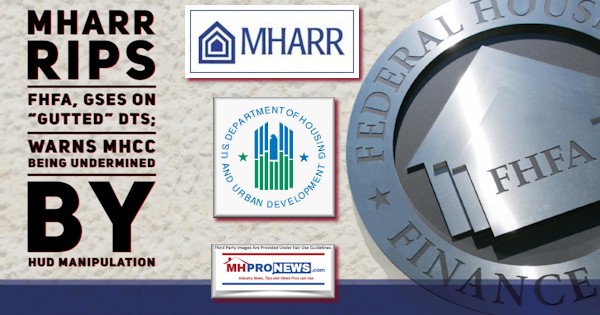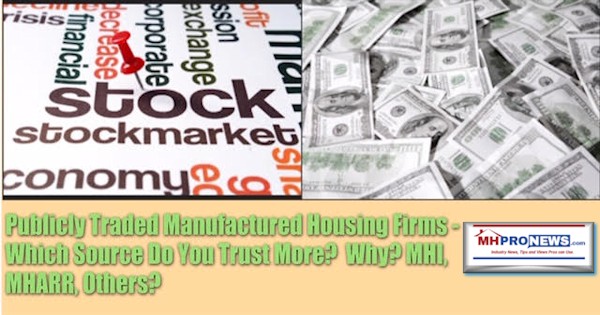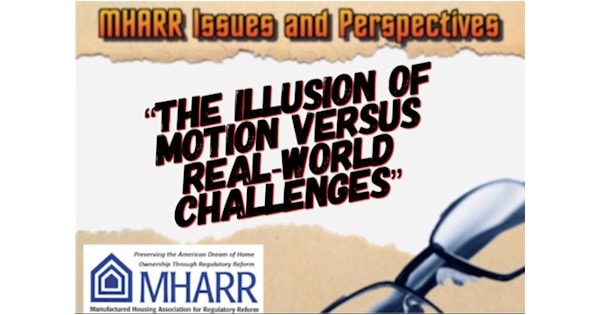
It goes without saying that manufactured housing is a subset of the larger American economy. As modest as the manufactured home industry may be today, it was not always so. Given the affordable housing crisis, the recognized quality that is documented by third-party research, and supervised by federally mandated inspections, what is the cause and cure for this scenario?
Properly understood, manufactured housing could be at the epicenter of a financial revival in America, according to research found at the report linked below. The reasoning is similar to that of the Opportunity Zones and is a logical compliment to it.

First, let’s look at the facts. Then, we will address what hobbles, harms, and could beneficially cure the ills that the industry is currently experiencing.
Facts and Third-Party Research
“The U.S. GDP increased to about 20.5 trillion U.S. dollars in 2018,” said Statista. By contrast, manufactured housing production at retail in 2018 was under $8 billion dollars. That means that manufactured housing was only about .000039 percent of the total U.S. gross domestic product (GDP).
But that doesn’t mean that the potential or value of the industry is insignificant. When U.S. homeownership rates aren’t even in the top 40 nations of the world, per Wikipedia, and with some 111 million living in rentals, there are compelling reasons to think that the industry’s potential is nothing short of massive.
Furthermore, when the history trends are pondered that gives even more reason to believe that the potential is significant.
Could that potential be a reason why well known billionaires like Warren Buffett and Sam Zell, or multibillion dollar firms that they or others lead, explain why they are eager to get their arms around the greatest possible share of the manufactured housing market? There are industry professionals who think so. One of the many is award-winning retailer Alan Amy. He explains why in easy to understand terms in the video below.
Innovation, Small Business, and Manufactured Housing
Research that follows reflects the notion that innovation comes more often from smaller businesses, not larger ones.
Those that recall the manufactured homes produced in the 1980s remember there were more factories from far more HUD Code housing producers. Balcony bedrooms, raised kitchens, sunken baths were just some of the innovations seen in that era that are difficult to find today. Why?
Job creation, innovation, and opportunities blossom when smaller, independent firms are allowed to thrive. One of several possible historic snapshots that makes that point is found in the article with videos linked below. What follows dovetails with third-party research about smaller businesses that follows that linked report.
Is there other reliable evidence of this claim that smaller firms innovate more than larger ones, beyond that reference above or to the wider variety of manufactured housing designs found in the 1980s?
Yes. Let’s dive into some third-party research and see that general pattern, and then apply those principles to manufactured housing.
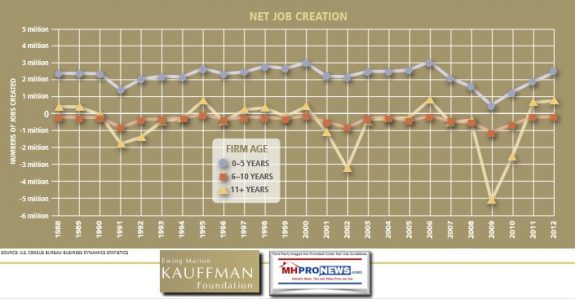
The Evidence-Based Smaller, Newer Business Story?
“Fundera exists to help you make better business decisions. That’s why we make sure our editorial integrity isn’t influenced by our own business. The opinions, analyses, reviews, or recommendations in this article are those of our editorial team alone,” says that firm’s website.
That’s an interesting claim to ponder as MHProNews explores an article by Fundera’s Alfonso Serrano, who wrote in September 2019 that, “Small businesses generate the majority of jobs in the United States…The U.S. Small Business Administration lends credence to these claims, citing internal reports that show, for example, that small companies accounted for 64% of new jobs created in the U.S. between 1993 and 2011. Small businesses, representing roughly 95% of all U.S. companies, are certainly important to the nation’s economic growth, providing employment for roughly half of U.S. employees.”
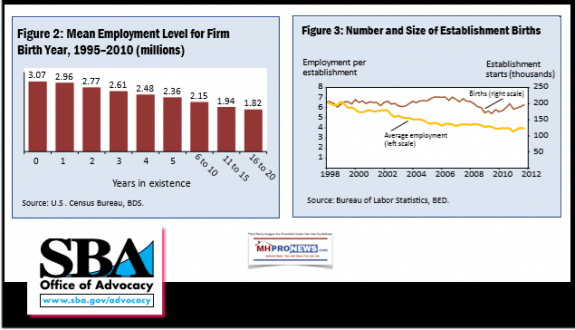
The reason this will be of interest to manufactured housing will become more evident as we dive deeper into the research Serrano cites. His report said “But those [SBA] figures lose gravity when you consider that the SBA views any company with fewer than 500 employees as a small business—99.7% of U.S. companies.”
“New businesses, not necessarily small ones, account for virtually all new job creation in the U.S. and nearly 20% of gross job creation, according to a 2015 study by the Kauffman Foundation, a research nonprofit. In the last three decades, the study adds, firms under a year old have created 1.5 million jobs annually,” said Serrano.
“Policymakers often think of small business as the employment engine of the economy. But when it comes to job-creating power, it is not the size of the business that matters as much as it is the age,” said Jason Wiens and Chris Jackson, authors of the report. “New and young companies are the primary source of job creation in the American economy. Not only that, but these firms also contribute to economic dynamism by injecting competition into markets and spurring innovation.”
That link by Serarno goes to the report by the Kauffman Foundation updated on September 2015 that opens with this statement: “Nearly eight years since the beginning of the Great Recession, the American economy finally gained back all of the jobs lost during the economic downturn. While this is positive news, underlying structural concerns remain, resulting in historically low labor force participation, high rates of unemployment and underemployment, and a “missing generation” of firms. Together, these factors are a drag on the economy, sapping dynamism.”
Serrano points out that the Kauffman Foundation study said that the rate of small business formation has generally been in decline.
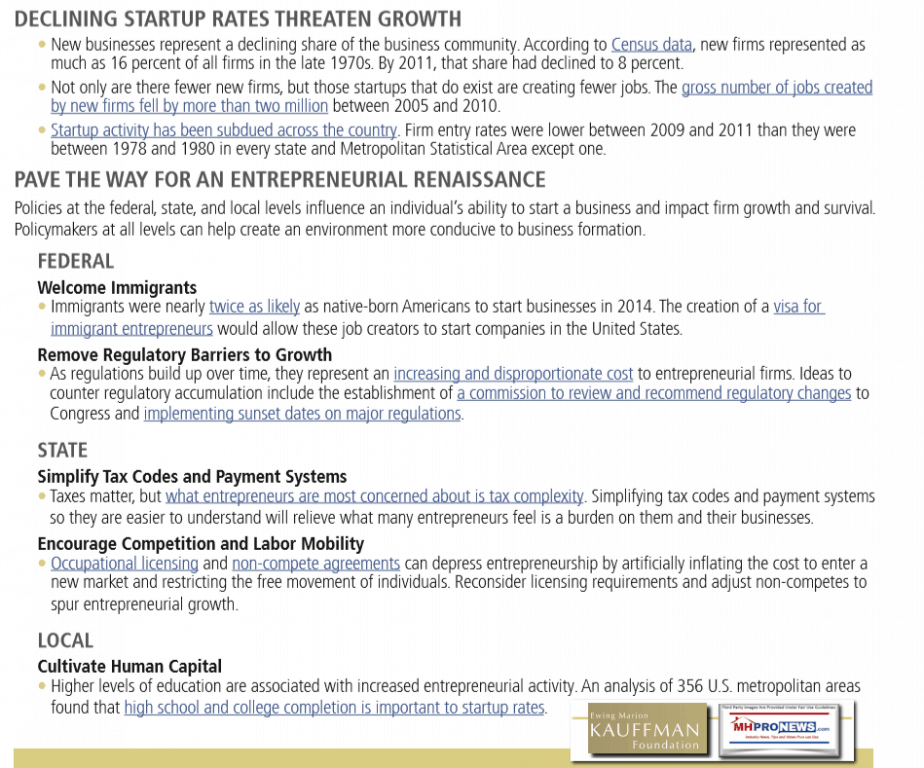
“Citing Census data, the authors of the Kauffman report note that by 2011 new companies represented 8% of all U.S. business, half as much as they represented in the late 1970s. And these firms are also creating fewer jobs. Between 2005 and 2010, according to the authors, job creation by new companies fell by more than 2 million,” Serrano wrote.
Serrano noted that since the election of President Donald J. Trump that small business confidence had risen, and along with it, small business hiring. He cited National Federation of Independent Businesses (NFIB) data, a source MHProNews periodically references too. Specifically, Serrano said this.
“A December study from the National Federation of Independent Business found a surge in optimism among small business owners after the presidential elections in November. Based on the survey of more than 600 small businesses, sales expectations and improved business conditions were the primary sources—generating levels of confidence that had not been seen since 2004.”
He closes with this point, “Many small business owners are being squeezed by this historically tight labor market,” said NFIB economist Bill Dunkelberg. “They are not confident enough to raise prices on consumers, which limits how much they can increase compensation and makes them less competitive in attracting qualified applicants.” Rephrased, because bigger businesses can often undercut smaller ones, there is only so much leeway that a small business has. The net result? Fewer new businesses, fewer jobs created, than would otherwise be the case.
- The evidence suggests that some of the logic for basing antitrust action based on short-term pricing being lower for consumers plays into the hands of consolidators, but ends up costing society and taxpayers more in the long run.
- It is parallel to the thinking that shipping jobs overseas saves American buyers money. It might be so for a short time window, but when jobs are lost, customers are also lost. Social safety net spending swells. All forms of unexpected consequences – like more forms of addiction or crime – might follow. Given what we now know from decades of these experiments in public policy, isn’t it better to reverse course while that is possible?
That backdrop is quick snapshot of serious concern to manufactured housing, as well as many other sectors of the economy, as the related data below will increasingly reflect.

Mergers, Acquisitions and Consolidation
“Historically, mergers tend to contain job losses. Most of this is attributable to redundant operations and efforts to boost efficiency,” said Investopedia on June 25, 2019. Again, lost jobs hurts wages because of the law of supply and demand. The reason jobs are rising in the last few years is due in part because demand is up for workers.

On both sides of the left-right political and advocacy divides, there are sources that point to this notion. The increasing concentration of economic power harms small businesses, job development, wields an outside influence over politics, along with other consequences of concern to investors, taxpayers, advocates, and others.

Pull Quotes from the Open Markets Institute
You don’t have to be a fan of billionaire and progressive mega-donor George Soros to recognize that some of what he’s done with his money – for instance, the publicly available Open Secrets website – has value regardless of your political views. Open Secrets is a free resource used by voices on either side of the political divide.
Similarly, the left-of-center Open Markets Institute has done some useful research, even though some may dispute their specific points of advocacy beyond the notion of enforcing antitrust laws more robustly. That noted, their core data is routinely sound. Separate the wheat from the chaff from Open Markets, and you have a significant case as to why modern antitrust action makes economic sense.
But before looking at those quotes from a progressive organization, let’s use a related quote from a GOP conservative, Senator Josh Hawley (MO-R), who recently said this:
“The Republican Party must defend America’s working and middle class against “concentrated corporate power” and the monopolization of entire sectors of the United States’ economy,” stated Senator Hawley. Note to first-time visitors here: MHProNews for some years has turned direct quotes bold and brown to make them ‘pop,’ but otherwise the text is as in the original.
In an interview on The Realignment podcast, Senator Hawley said that “long gone are the days where” American workers can depend on big business to look out for their needs and the needs of their communities.”
Instead, Hawley explained that the increasingly “concentrated corporate power” of whole sectors of the American economy — specifically citing Silicon Valley’s giant tech conglomerates — is at the expense of working- and middle-class Americans. But while he noted those tech giants, he did not exclude other conglomerates.
Senator Elizabeth Warren (MA-D) recently said to her supporters “The wealthy and well-connected will always protect each other at the expense of everyone else, and it’s going to take a grassroots movement to stop them.” When both the left and the right cite similar concerns – even if their solutions may differ – it is worth paying attention to the details.
That fits a narrative that was carefully developed in a prior report by MHProNews that focused on a review of the New York Times column by David Leonhardt entitled “The Monopolization of America,” it can be found at the link below.
New York Times-David Leonhardt-“The Monopolization of America,” Manufactured Housing Slant
While his work focuses on the tech sector, the economic principles from the New York Stern professor Scott Galloway cited below applies to other sectors of the economy, including manufactured housing.
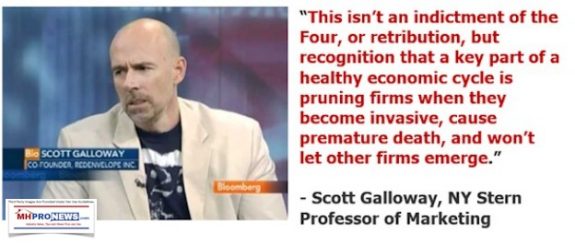
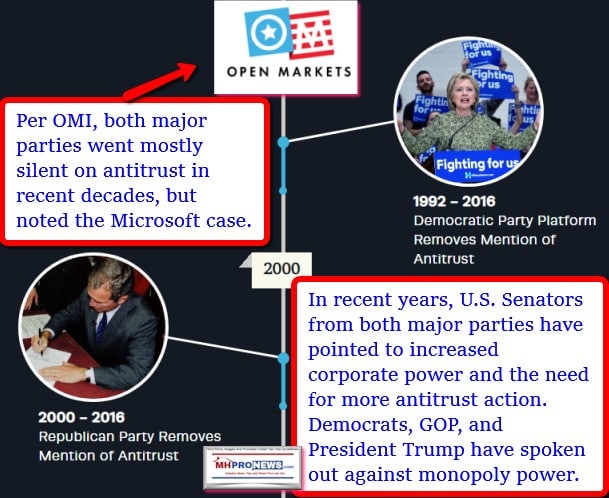
OMI
With that foundation, the following from the Open Markets Institute (OMI) and what it portends to America and our industry comes into sharper focus.
In an article under the subheading of “Monopoly Basics” is one entitled “Entrepreneurship & Monopoly,” from which the bullets below are taken. In most cases, each bullet should be understood as a quote from that article but note that some may have been re-arranged from the original sequence.
- Market concentration harms new business formation in many ways.
- One line of thinking is that less access to bank lending makes it harder for business owners to sustain and finance new ventures.
- Similarly, overly broad regulations can hamstring new startups.
- Another less discussed cause is a set of legislative changes that have weakened anti-monopoly laws over the past thirty years. These shifts have yielded a more concentrated economy, with less dynamic, incumbent firms replacing more innovative startups.
- Similarly, well-established firms in concentrated industries can collude with each other to fix prices and production levels. These anticompetitive actions squeeze enterprising suppliers and prevent them from competing with incumbent firms. Even without collusion, concentrated industries often make it much harder for newcomers to break in by exploiting their purchasing power over suppliers.
- Recent years also have seen the emergence of platform monopolies that increasingly suppress new business formation by competing with and exploiting the businesses that use these platforms.
- One type were called “fair trade” laws. The Robinson-Patman Act for instance, prohibited the practice of selling an item below cost to drive a competitor out of business. Another, the Miller-Tydings Act set a floor on how inexpensively big retailers could sell their products. Specifically, the legislation ensured that competition among retailers would involve more than just price discounting.
- However, by the mid-1970s, a bipartisan group of politicians worked to repeal these policies. The Consumer Goods Pricing Act of 1975 overturned the Miller-Tydings Act of 1937, and led to the end of most “fair trade” laws. In the early 1980s, the Reagan Administration’s Justice Department stopped enforcing the Robinson-Patman Act and re-wrote The Department of Justice’s Merger Guidelines. These changes drove consolidation among retailers, giving them tremendous power over their independent suppliers.
Let’s jump back to an earlier part of the same article, which while misusing the terminology of ‘democracy’ instead of a ‘republic’ at the end of the sentence, otherwise correctly says “…Thomas Jefferson’s celebrated the civic virtue of “yeoman farmers.” Since then a long line of American political thinkers have seen independent, small-scale business and property owners as guarantors…” of personal liberty, as found in a republic.
That harkens back to a statement from the Trump Administration’s top cop at the Department of Justice for antitrust efforts, who said the following.
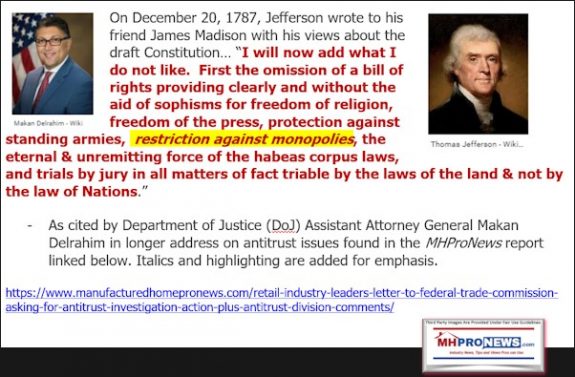
With that segue aside, let’s pivot back to the OMI, which also said that:
- Americans also know that new business ventures are essential to economic progress and upward mobility. New enterprises, whether local pharmacies or tech startups, help Americans build assets that can fund a retirement or be passed on to future generations. Even more, startups help create an inclusive economy. They provide opportunities for women and minorities to more quickly achieve financial success and leadership than in larger firms.
- New enterprises also are responsible for high rates of job-creation and innovation. According to the U.S. Small Business Administration, small firms employ over half of the private-sector workforceand created nearly two-thirds of the nation’s net jobs over the past fifteen years. Large firms generated 1.7 patents per hundred employees, whereas small firms generated an impressive 26.5 patents per employee.
For a few moments, let’s ponder a flashback to over 200 years ago, and cite the following from Republics Ancient and Modern, Volume III, where we see this on page 190.

Now, fast forward to the recent launch of the OMI’s Matt Stoller, author of the anti-monopolistic treatise, “Goliath,” which takes a roughly 100-year snapshot of the history of the ebb and flow of antitrust action in America. That report with video can be access via the linked text and/or image box below.
Summing Up
Manufactured Housing Pro News (MHProNews) and our MHLivingNews sister site have for some years has sounded the alarm almost alone among manufactured housing trade media about the problems caused by monopolization, and how it specifically has harmed our industry.

The case can be made that Warren Buffett led Berkshire Hathaway – which owns Clayton Homes, 21st Mortgage Corporation, and Vanderbilt Mortgage and Finance – arguably at times in conjunction with others, has worked in ways that has hobbled the industry.

While some might argue that Clayton has more bad news because they are larger, that ducks the issue that Clayton before they became the dominating firm they are today was at the epicenter of problematic reports that date back over nearly a decade in the case of the Haitian disaster, and longer in the instance of the FEMA mess post-Katrina.

As a close review of the video interview of Kevin Clayton posted below reflects, despite sugar-coated smiles and kind words, there is ample evidence – which Clayton, the Manufactured Housing Institute (MHI), their affiliated lenders and allies has not opted to dispute when asked – the principles of the Moat and being a tough competitor ala the Buffett principles espouses have demonstrably harmed the industry in a variety of ways. Thus today, manufactured housing – during an affordable housing crisis – is at a lower ebb during the last 15 years than at any other time in the industry’s history.
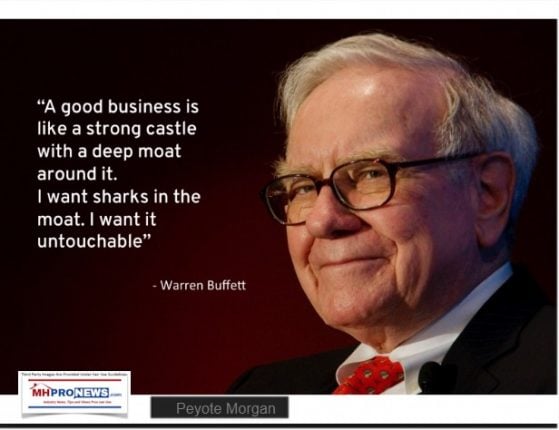
Since this video above was made, Clayton’s market share has roughly doubled. Keep in mind that some things said are accurate, others are arguably head-fakes. Watch the annotation to get a sense of which is which, based on our analysis.
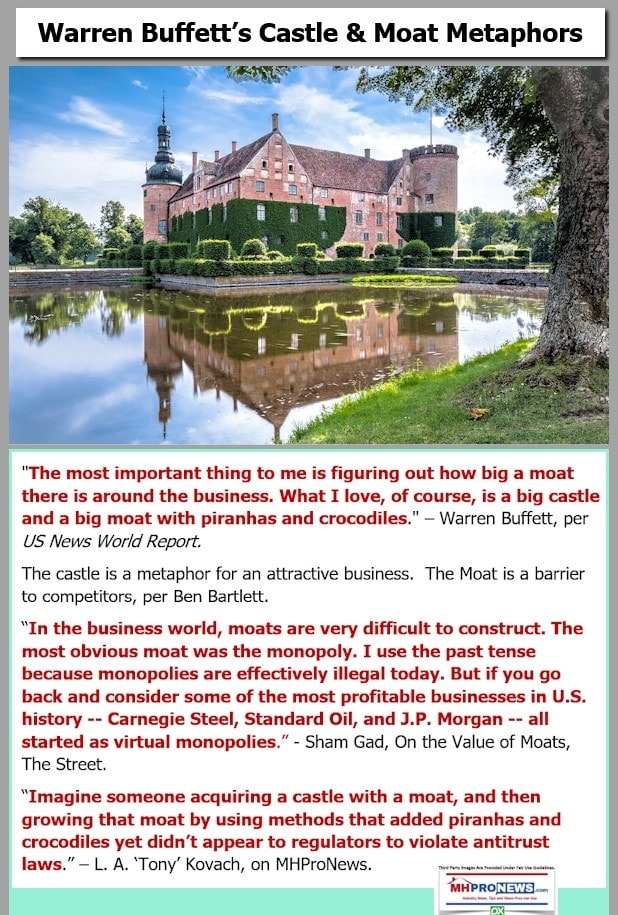
Publicly traded firms make a similar point. Those statements should be understood to be true and accurate according to the best of their knowledge and belief, because they are made under penalties of perjury. Fines and even prison time could result from deliberate misinformation.

Strengths, Weaknesses, Opportunities, Threats (SWOT)
Every business or industry has its own unique SWOT.

Manufactured housing is no exception.

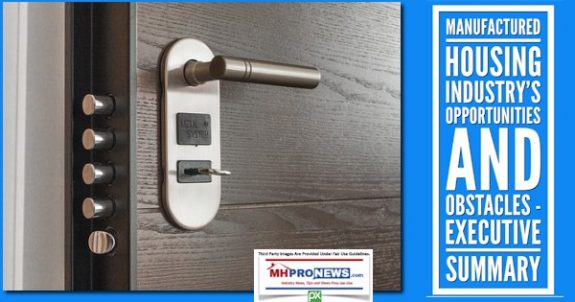
Third party research, organized by a small business and manufactured home expert in the article linked below, indicates that a proper implementation of existing federal laws could result in millions of Americans becoming homeowners, building their personal wealth. HUD Secretary Carson has said on several occasions that home owners have a typical net worth of some $200,000 while renters have only a typical net worth of about $5,000. The impact over time of creating millions of more homeowners is thus tremendous.
Given that manufactured homes, despite the errant claims of some, can and do appreciate in value, the benefits to public policymakers and the tax base is significant when more renters become owners.
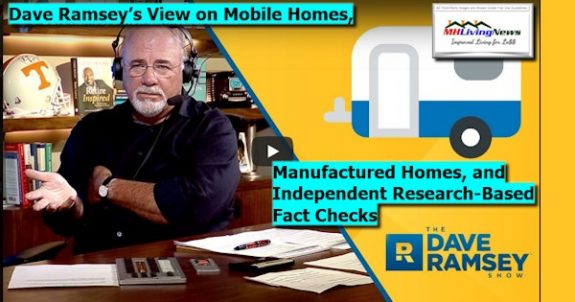
The Bottom Line?
Manufactured Home Living News (MHLivingNews) and MHProNews from the start of our 10+ year history has been a strong advocate for ethical business practices and just treatment of consumers. For years we’ve spotlighted the problematic behavior of companies that violated laws, or did seemingly unethical and abhorrent practices, as a kind of morality and cautionary tale. That has been consistent.
What we did not realize for some years was that the industry was arguably being undermined from within, even though a few made such claims, there seemed to be counter-indicators to those claims.
It was roughly in the last two years that documentary and other evidence was provided to MHProNews from sources within the industry, often from MHI-only member firms as news tips, that we began to explore the notion that what some called ‘the big boys’ were not just occasionally crossing the line, but that there may be a pattern to it.
The Golden State Manufactured-Home Owners League (GSMOL) made a published claim that was brought to our attention that our follow up research confirmed and went deeper on that lead. Summing up, a variety of evidence and sources began to point to the root issues of many of problems afflicting manufactured housing consumers and independent professionals are originating, being accepted or even actively fostered by operations with our industry. There were misleading and arguably deceptive claims from within the Manufactured Housing Institute (MHI) – again, often as news tips from ‘white hat’ industry members – that when examined reflected troubling disinformation by MHI to their own members and readers. We began publishing those reports too, holding those to account, routinely providing them with the opportunity to refute, correct, or otherwise comment on those allegations. For a time they did reply, until they ejected our firm from their membership, and following that, the direct replies largely stopped.
Our reporting and analysis has not been without fallout and consequences. When other manufactured home industry publishers were asked why they weren’t covering these same issues, an example of the kind of response obtained is shown below.
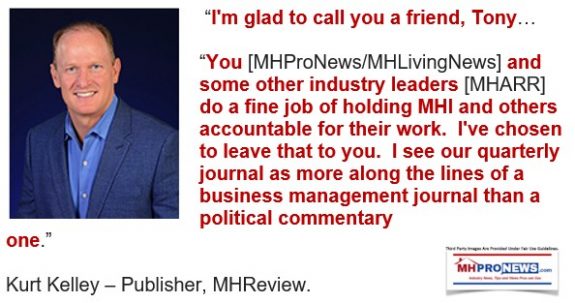
Several threats were made, often directly by MHI connected attorneys. Lanham. Anonymously mailed items came from time to time, but as we published reports about those thinly-veiled threats, they tended to stop. Federal, state, and local investigators have been notified, and there are reports of initial and ongoing investigations.

Good existing laws must be enforced. That includes antitrust laws, because the failure to enforce them robustly is now arguably threatening not only the tech sector, but others as well, including manufactured housing.
But it arguably must also include other laws being enforced, including RICO.

Still more laws should be enforced that would benefit consumers and smaller businesses.

The concerns raised by MHProNews, while expressed differently by others, are by no means alone. Consumers and professionals alike, privately and publicly have taken stands.

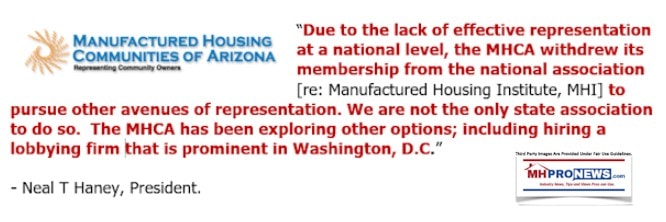

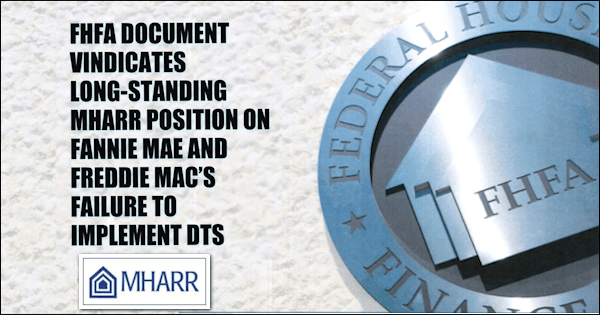
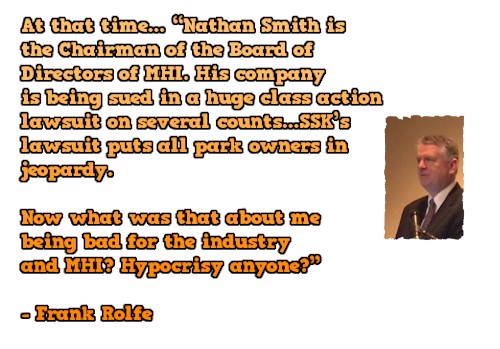
In hindsight, as the pattern of behavior became clear, the head-fakes and rope-a-dope ploys became clearer.
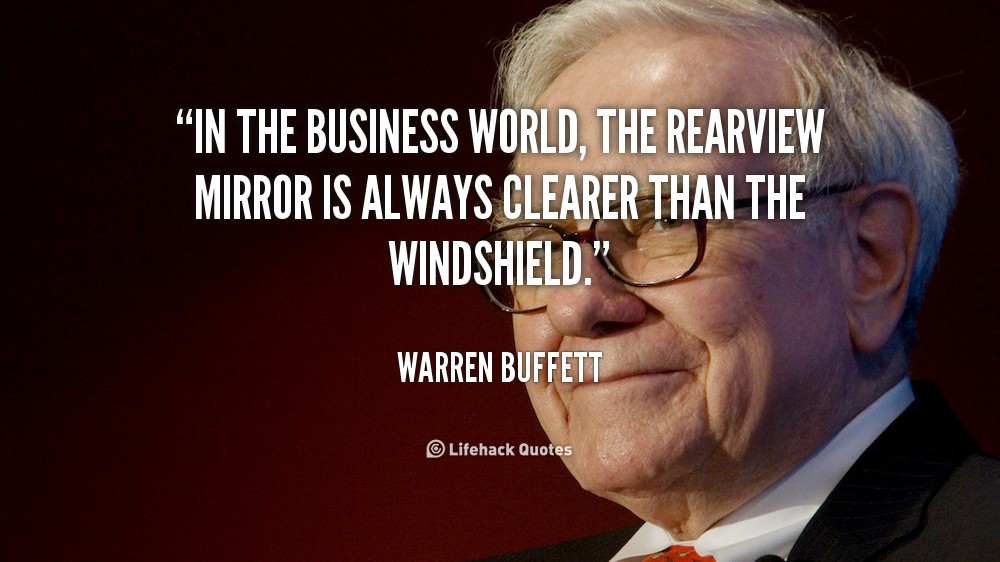
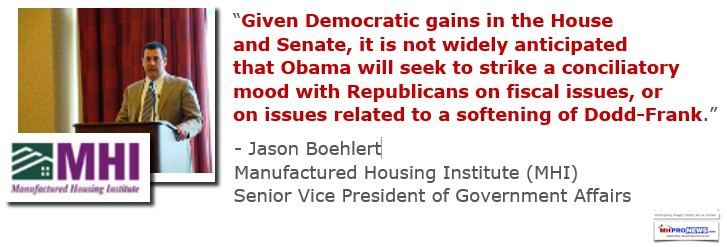
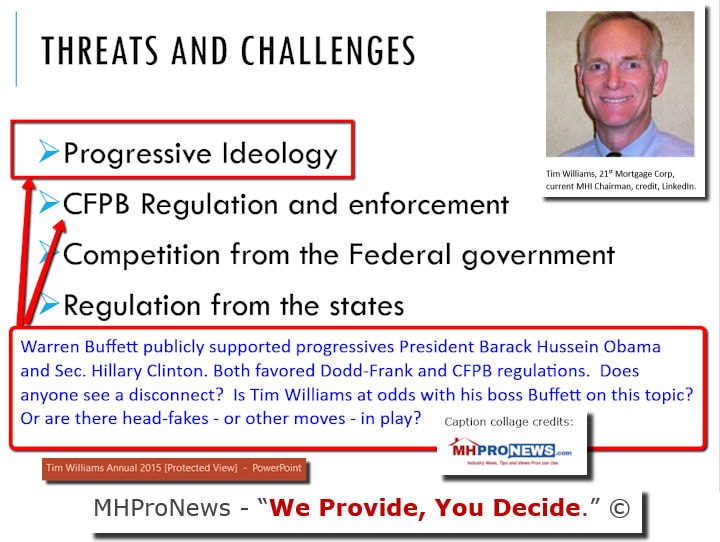
Warren Buffet is certainly allowed to do with his money whatever fits in the norms of the law and propriety. That said, if federal investigators determine that he has deliberately weaponized the manufactured housing industry to the detriment of millions of existing home owners, thousands of smaller businesses, taxpayers, and others, that merits the full weight of the law being brought to bear on anyone that has violated the law.
Williams has been a faithful Berkshire member for years, serving as an MHI Chairman. In hindsight, it was the truth hiding in plain sight that Warren Buffett was publicly promoting the opposite of what MHI claimed to be working to achieve.

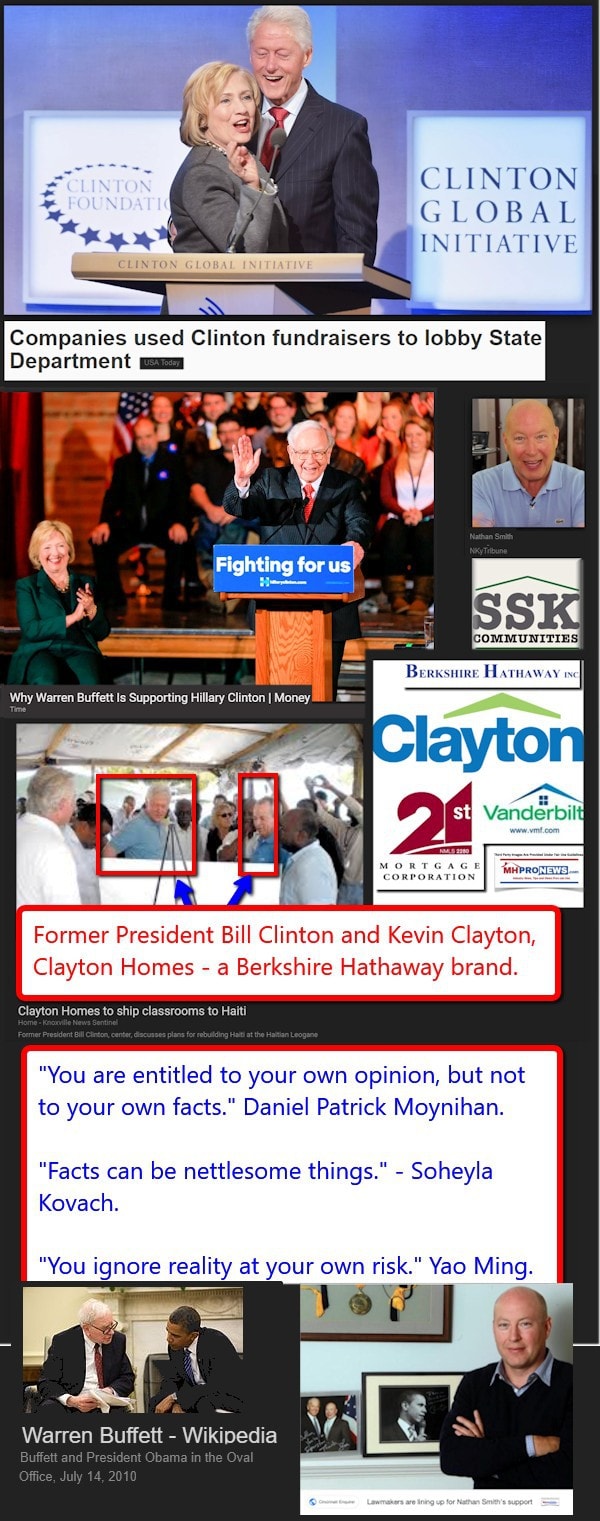
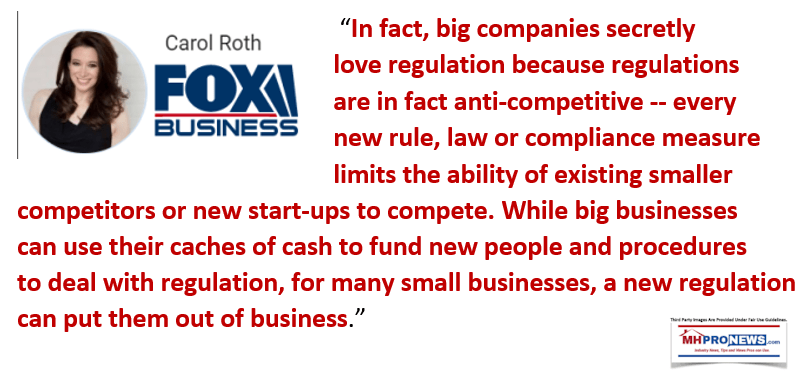
There will be more to learn in the related reports and in upcoming reporting and analysis here soon. Stay tuned, learn more, and then use that information wisely.
That’s your second installment on today of “News through the lens of manufactured homes and factory-built housing,” © where where “We Provide, You Decide.” © ## (News, analysis, and commentary.)

Soheyla is a managing member of LifeStyle Factory Homes, LLC, the parent company to MHProNews, and MHLivingNews.com. Connect with us on LinkedIn here and and here.
Related Reports:
Click the image/text box below to access relevant, related information.
